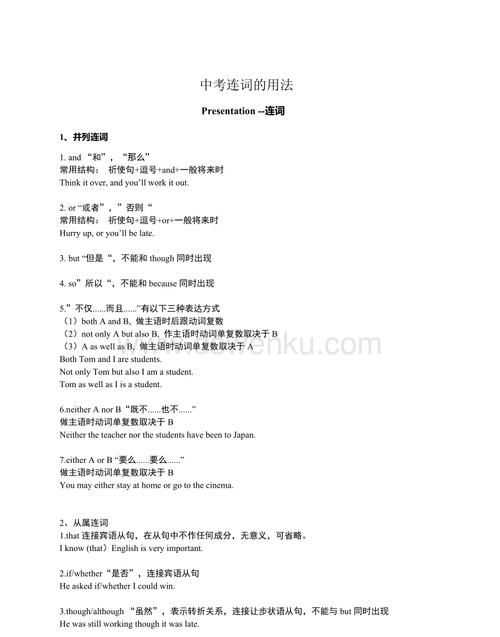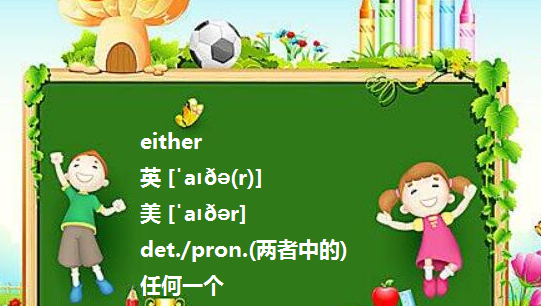本文目录
also是什么意思
“also”的意思:adv. 也;而且;同样、conj. 并且;另外、n. (Also)人名;(罗)阿尔索
1、读音:英 [ˈɔːlsəʊ]、美 [ˈɔːlsoʊ]
2、相关短语:
but also 而且 ; 从古沿用下来的连词 ; 但也
Also home 还家
however also 然而也 ; 不过也 ; 但是也可以
Also astor 亚拉斯托 ; 阿拉斯特尔
Also endless 还不断 ; 也无止境 ; 也层出不穷
also I 还我 ; 还有我 ; 我也
3、例句:This rule has also been applied in the case of a purchase of used tyres and tubes.
这个规定也已经用于购买使用过的轮胎和内胎。

扩展资料:
“also”的近义词:moreover
1、读音:英 [mɔːrˈəʊvə(r)]、美 [mɔːrˈoʊvər]
2、表达意思:adv. 而且;此外
3、相关短语:
Moreover Also 而且对也
Moreover destroy 甚至毁灭
moreover- 而且
Moreover Continues 而且不止
moreover we 同时我们
Moreover Person 而且人
4、例句:She saw that there was indeed a man immediately behind her. Moreover, he was observing her strangely.
她看到的确有个男人紧跟在她身后。而且,他还在怪异地观察着她。
tooalsoeither的用法是什么?
also,
too,
either
与
as
well
的用法区别
这四个词均可表示“也”,其区别如下:
1.
too
和
as
well
多用于口语中,语气较轻,通常用于肯定句或疑问句,一般不用于否定句,且通常放在句末。如:
I
like
you
too
[as
well].
我也喜欢你。
Are
they
coming
too
[as
well]?
他们也来吗?
too
有时也紧跟在主语后(注:
as
well
不这样用),此用法较正式。如:
I,
too,
know
where
he
lives.
我也知道他住在什么地方。
注意:在
Me
too,
You
too这类简略答语中,通常不用
as
well或also。如:
A:I’m
tired.
我累了。
B:Me
too.
我也是(from
***
)。
2.
also
比
too
和
as
well
正式,一般也不用于否定句,它在句中的位置通常是紧靠动词,即放在行为动词之前,特殊动词之后。有时为了强调也放在句末(但不常见)。如:
He
also
came.
/
He
came
also.
他也来了。
She
is
young
and
beautiful,and
also
rich.
她年轻漂亮,而且有钱。
说明:also
有时用于句首(其后通常有逗号),相当于连词
and。如:
Also,
his
mother
was
dead.
再说,他母亲又过世了。
3.
either(也)通常只用于否定句,且要放在句末。如:
I
don’t
know,
either.
我也不知道。
He
hasn’t
finished
it,
either.
他也还没有做完。
注意:有时在肯定句之后跟一个否定句,可能用
too,also。如:
He
came,
but
she
didn’t
also
came.
他来了,但她没有也一起来(from
***
)。
He
went
to
Washington,
but
not
to
New
York
too.
他去了华盛顿,但并不是也去了纽约。
比较(from
***
):
He
didn’t
buy
a
computer,
and
she
didn’t
either.
他没买电脑,她也没买。
He
bought
a
computer,
but
she
didn’t
too.
他买了台电脑,但她没有也买台电脑。

also应该怎么用
also词语用法
1、属正式用词,主要用于肯定句或疑问句,一般不用于否定句 (否定句可用 either),它在句中通常放在实义动词之前,特殊动词 (动词be、情态动词、助动词)之后,有时也放在整个谓语前面或放在句首或句尾 (较少见,且多半是因为强调之故)。
例句: Also this room wasdirty. 这个房间也很脏。
2、有时由于 also 位置不同,可能会导致句子含义不同。
例句: We alsoregard him as a great writer today. 我们也 (同别人一样)把他看成当今伟大的作家。
3、 在简略答语中,习惯上不用also, 如一般不说 I also, 但可说Metoo, You too等之类的。
例句:
A:I’m tired. 我累了。
B:Me too. 我也是。
B:I also. (误)

扩展资料:
词义辨析
also, as well, besides, either, moreover, too这组词(组)都有“也,此外,还有”的意思。其区别是:
1、also一般用于肯定句,有强调意味,位于主谓语之间,即实义动词之前,助动词之后;
2、 too只用于肯定句中,一般位于句末,比also更口语化;
3、either一般只用于否定句,多位于句末;
4、as well和too一样多用于口语,放在句末;
5、besides与moreover词义基本相同,但moreover后面所叙述的,通常比前面所叙述更为重要或更深入一步,在词序方面, moreover往往用于句首,另外, moreover是较为正式的用语。
举例如下:
1、He also asked to go.他也要去。
2、I can also do it.我也能干那个活。
3、English is not easy, and French is not easy either.英语不容易,法语也不容易。
4、He is a teacher, and a writer as well.他是个教师,也是个作家。
5、I don't like those shoes; besides, they're too expensive.那双鞋我不喜欢,而且也太贵。
6、I don't like skating; moreover, the ice is too thin.我不想去溜冰,再说冰层也太薄。
7、The Opposition have consistently accused the Government of corruption.Moreover, they have named names.反对党一直在指责政府腐败,而且是指名道姓的。
too,also,either,as well,as well as的区别
also,as well,as well as,either,both,too的区别为:指代不同、用法不同、侧重点不同。
一、指代不同
1、also:指同样。
2、as well:指还。
3、as well as:指此外。
4、either:指也。
5、both:指两个都。
6、too:指又。
二、用法不同
1、also:also主要用于肯定句和疑问句。在书面语中,also偶可用在no,nothing或其他带有否定意义的词之前,而在否定词之后则不能用also,而要用either(但not also可用于反诘疑问句或修辞疑问句,偶尔也用于陈述句)。
2、as well:用作副词的意思是“而且,还有”,引出另一个情况,以作补充。可用于句首、句尾,也可用于句中,常常用逗号或分号与句子的其他成分隔开。

3、as well as:不但…而且(谓语与第一主语一致)。
4、either:either可单独用,也可和of连用,of后跟复数名词或复数代词,但意义明确时可省略of短语。
5、both:both用作形容词与定冠词、指示代词、形容词性物主代词、名词所有格等限定词连用时,应置于其前,而不能置于其后。
6、too:too也可作“太”“过于”“过分”解,修饰形容词或副词,与动词不定式连用时构成too...to结构,以肯定形式表示否定意义。
三、侧重点不同
1、also:also常用于be动词,情态动词,助动词之后,行为动词之前。
2、as well:as well多用于口语,一般放在句末。
3、as well as:as well as用作连词引出比较从句,其义为“和…一样好”。
4、either:either用于否定句中,置于句末。
5、both:both指两个人或物,而all指三个以上的人或物。
6、too:多用于书面语,一般放在句中与动词连用。
以上就是关于also连词的用法 ,also是什么意思的全部内容,以及also连词的用法 的相关内容,希望能够帮到您。
